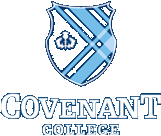
en•dow verb 1. to provide with a permanent fund or source of income.

I recently dug out the Summer 2012 issue of Endow, where I had written these words: "It's a unique thing in life to stand directly between two college presidents. Thankfully, in our case, it's also a good thing." The occasion that prompted those words was Covenant's transition between Dr. Niel Nielson and Dr. Derek Halvorson as the fifth and sixth presidents. While I was speaking figuratively, that issue of Endow included a picture of me standing between the two presidents. To my surprise, eleven years later, I again find myself "standing between" two presidents. Just as it was a good thing in 2012, it is once again a good thing in 2023.
Dr. Derek Halvorson has led Covenant faithfully for the past eleven years, and we are so grateful that he will continue fostering leadership for Covenant students through the Brock-Barnes Center for Leadership. I was glad to be able to pay tribute to him in the last issue of Endow. And in a testimony to God's goodness and provision, here we are in the very next issue of Endow, welcoming the seventh president of Covenant College, Dr. Brad Voyles.
When Derek made his announcement earlier this year, I assumed that we were in for a long time of transition as we searched for a new president. In March, a search committee was formed, made up of board members, faculty, and staff, and we hired an outside firm to lead us through the process. The nationwide search produced dozens of applicants, eventually narrowed to a handful of finalists.
Meanwhile, Dr. Voyles was named Interim President. He worked closely with the cabinet to craft a two-year plan. The plan aimed to move the college forward during the transition and set the stage for the next president to begin on a solid footing. It has been energizing and encouraging to work under Dr. Voyles's leadership as Interim President. Dr. Voyles is a visioncaster, a thinker, a gatherer of people, and an encourager. He cares deeply about holding to the mission, vision, and values of the college. He is willing to tackle pressing issues head-on, willing to ask hard questions and challenge assumptions, and willing to re-examine how we do things.
So, for the second time, I have a front-row seat to watch God at work in a pivotal time in Covenant's history. As I marvel at God's enduring faithfulness to the college and the foundation, I am humbled by His amazing provision and gentle care for this community. I am excited to see what He has in store for this next chapter.
Marc M. Erickson '92 CFP®, CLU®
Executive Director
Covenant College Foundation
Revocable Living Trusts
Part One of a Two-Part Feature on Living Trusts
by HUGH A. "JAY" MITCHELL, JR., ESQ.
WHENEVER CLIENTS ASK ME whether they should include a Revocable Living Trust as a part of their estate plan, my mind goes immediately to The Emperor's New Clothes. In that classic folktale, the emperor was told by his unscrupulous tailors that the special clothes they were making for him were invisible to those who were fools and "unfit for their position." Intimidated by this claim, neither the emperor nor any of his subjects - except one young wag - were willing to admit that, in fact, "The emperor has no clothes!"
The Revocable Living Trust (RLT) has become so oversold by hyperbolic
claims that if someone were to say a person won't benefit from an RLT,
they run the risk of being told they are "unfit for their position."
Nevertheless, the truth is that, depending on the client's age and other
circumstances, an RLT can be extremely beneficial and should be the
cornerstone of that client's estate plan; however, it is equally true
that, for many, the RLT offers minimal, if any, real benefits.
The Concept
The RLT is, of course, a trust. Stated most generally, a trust is an ownership arrangement in which one person (the Trustee) holds title to property, subject to an obligation to manage and use that property for the benefit of another (the Beneficiary). But the general term "trust" can be extremely confusing because trusts come in a broad variety of different forms, each designed to meet one or more goals. However, that confusion can be eliminated by a basic understanding of the simple way in which the entire universe of trusts is classified.
All trusts fit into one of two categories: testamentary or living. A testamentary trust is so-called because it's created under one's Last Will and Testament. Accordingly, a testamentary trust does not become operative until the death of the one who made the will that created the trust. By contrast, a living trust is created by an agreement or declaration, and that trust becomes operative immediately while the creator of the trust (the Settlor) is yet living. Moreover, just as all trusts can be pided into two types, all living trusts can be classified into two sub-categories: revocable and irrevocable. The defining characteristic of a revocable trust is that the Settlor retains the power to amend or completely revoke the trust. And, as you would expect, once created, an irrevocable trust may not be revoked or amended by the Settlor.
Hence, from its title, we know that the Revocable Living Trust (or RLT) is a trust that is operative while the Settlor is living and can be amended-even revoked-at any time, so long as the Settlor is still living and legally competent. In addition to its revocability, the RLT is especially flexible in that the Settlor (the creator of the trust) may also be the Trustee and lifetime Beneficiary, thereby retaining both the control and the benefit of the property transferred to the RLT ownership.
Used as an estate planning tool, the RLT is often referred to as a "will substitute" because most of the dispositive provisions that normally would be contained in one's Will are transferred to and made a part of their RLT document (the Trust Agreement).1
Advantages of the RLT
The primary advantages that might recommend the use of an RLT include:
-
Probate Avoidance:
Assets transferred to the RLT before the Settlor's death will pass at death to the Beneficiaries outside of the probate process, thereby potentially saving some expense and/or delay. -
Property Management:
In the event of incapacity, the Successor Trustee can step in and manage the assets owned by the RLT seamlessly and effectively. -
Privacy:
Upon death, one's Will must be filed with the local probate court; thereafter, that document is open to public inspection. Similarly, assets passing by one's Will must be reported, and, again, this information is open to the public. By contrast, neither the Trust Agreement nor the assets owned by the RLT at the time of death are required to be made public. Consequently, to the extent one's dispositive plan is contained primarily in the Trust Agreement and such assets are largely owned by the RLTat the time of death, the settlor's estate plan and the distribution of assets after death remain private matters known only to the named fiduciaries and beneficiaries. -
Avoidance of Ancillary Administration:
For the individual who (either in his or her individual name or jointly, as a tenant in common) owns real estate located in one or more domestic states outside of the state of domicile, ancillary probate proceedings in those other jurisdictions can be avoided by transferring such "foreign" real estate to the RLT during the settlor's lifetime
Conclusion
Given the advantages described, an RLT certainly has its merits. So, should an RLT be a part of your estate plan? Again, it depends. There are many aspects to consider in a Revocable Living Trust. In the second part of this article (coming in the next issue of Endow), we will talk about the tax advantages of a Revocable Living Trust (are there any...?), look at some of the disadvantages of an RLT, and discuss basic mechanics. At the end of it all, my goal is that you might have a better understanding of Revocable Living Trusts and their limits, as well as their benefits.
1 One still needs a Will (what is referred to as a "Pour-Over Will") even if he or she has a Revocable Living Trust. This is a relatively short Will which, at one's death, collects any of the decedent's individually-owned, non-beneficiary assets not already owned by the RLT and "pours" them into the RLT for disposition in accordance with the terms of the Trust Agreement.

Jay Mitchell
For more than 25 years, Jay has been a partner in the Baltimore law firm of Stewart, Plant & Blumenthal, LLC, which is devoted exclusively to trusts and estates and tax planning. Jay and his wife, Denise, live in Annapolis, Maryland, where Jay serves as a Ruling Elder in the Evangelical Presbyterian Church of Annapolis. Jay and Denise are blessed to have eight children, four of whom have graduated from Covenant College, and they also have been graced with 17 grandchildren so far!

Heritage Society Tea
The annual Heritage Society Tea, a treasured part of each Homecoming weekend, was held at the Kirk on September 29, 2023. The Heritage Society recognizes those friends of the college who have included Covenant in their estate plans. Most often, estate gifts help build the college's endowment, thus strengthening Covenant for years to come and providing valuable resources for student scholarships, faculty, and facilities.
Each year, a different academic discipline is featured at the tea. This year's event featured the biology department. Approximately 45 Heritage Society members enjoyed tea, scones and desserts while hearing from assistant professor of biology Dr. Lynell Martinez and biology student Lydia Moore`25. Dr. Martinez shared her passion for learning about creation through a deeper understanding of our Creator and His ongoing work to redeem all things to Himself. Lydia shared about the joy she finds in studying Biology in a Christian academic setting among supportive students and faculty. College president, Dr. Brad Voyles, closed the time by giving an update on the college and answering questions from Heritage Society members.
Archived Newsletter
Summer 2020 Newsletter
Winter 2017 Newsletter
Spring 2016 Newsletter
Winter 2016 Newsletter
Autumn 2015 Newsletter
To subscribe to the Covenant College Foundation's free quarterly newsletter email your name, street address, city and state to [email protected]
















#CovenantCollege #WeAreTheScots